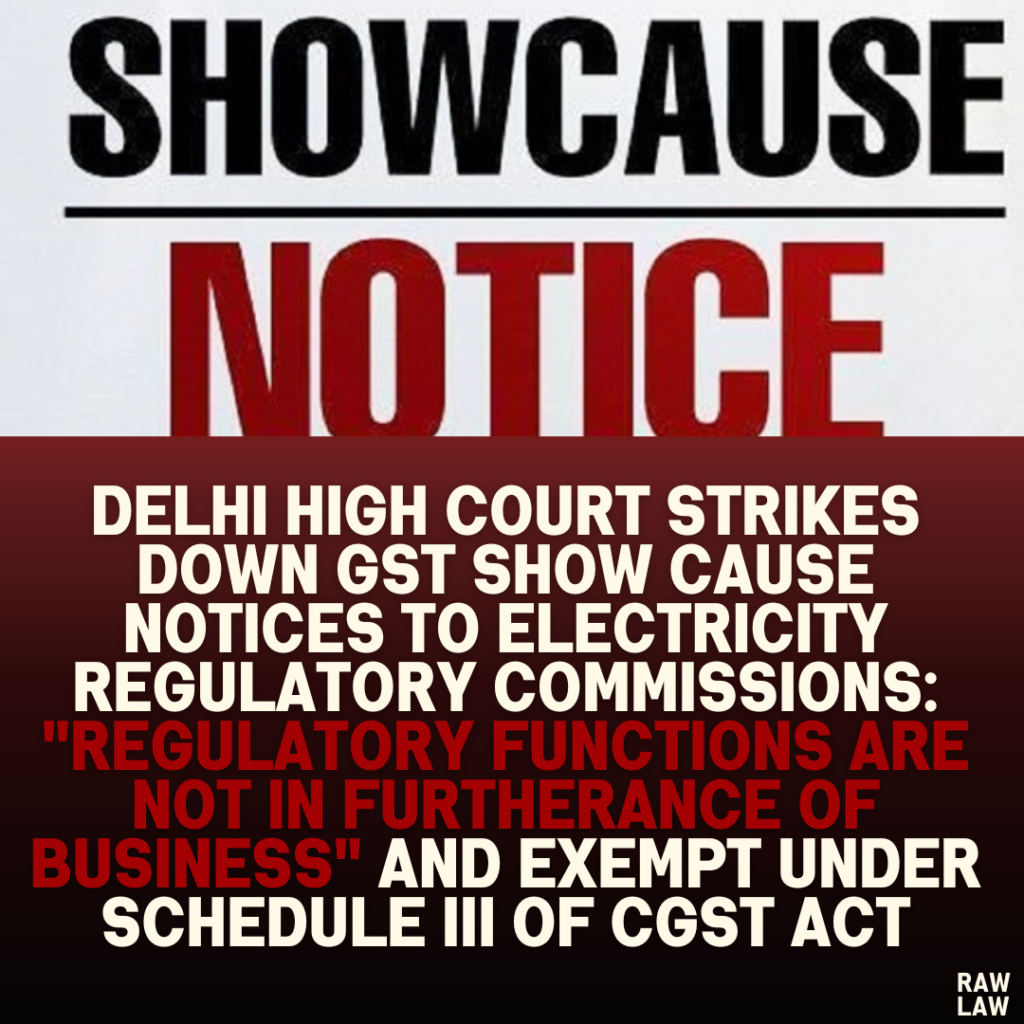Court’s Decision:
The Delhi High Court quashed Show Cause Notices (SCNs) issued to the Central Electricity Regulatory Commission (CERC) and Delhi Electricity Regulatory Commission (DERC). The court concluded that the regulatory functions performed by these commissions do not constitute “supply” or “business” under the Central Goods and Services Tax (CGST) Act, 2017, thereby making the fees collected by them non-taxable.
Facts:
- SCNs Issued: The Central Goods and Services Tax authorities issued SCNs to CERC and DERC, demanding tax liabilities for fees collected in their regulatory roles. The notices alleged that these fees were taxable under the CGST Act.
- Types of Fees Collected: The commissions collected fees under various heads such as:
- Filing fees
- Tariff fees
- License fees
- Annual registration fees
- Miscellaneous fees
- Respondents’ Argument: Authorities claimed that these fees were taxable as “support services to electricity transmission and distribution services,” under Service Accounting Code (SAC) 998631. They asserted that such functions constituted “business activities.”
- Petitioner’s Argument: The commissions argued that their functions were statutory and regulatory, performed in public interest, and could not be treated as “business” or “supply” for taxation purposes.
Issues:
- Are the commissions’ regulatory functions considered “business” under the CGST Act?
- Do the fees collected by the commissions qualify as taxable services under the GST regime?
Petitioner’s Arguments:
- Regulatory Nature of Functions: The commissions emphasized that their roles under the Electricity Act, 2003, were purely statutory and regulatory, including tariff determination and licensing. These were performed in public interest and did not involve profit motives.
- Exemption Under Schedule III: They argued that their adjudicatory and regulatory functions had all the trappings of a quasi-judicial tribunal. Schedule III of the CGST Act exempts services rendered by courts or tribunals from taxation.
- No “Supply” Involved: They contended that their activities did not involve any “supply of goods or services” under Section 7 of the CGST Act, as these were statutory obligations without commercial intent.
Respondent’s Arguments:
- Regulatory vs. Adjudicatory Functions: Authorities argued that regulatory functions were distinct from adjudicatory functions. While adjudicatory functions may be exempt under Schedule III, regulatory functions, such as issuing licenses and determining tariffs, were taxable as they were performed for consideration.
- Support Services: The respondents classified the commissions’ activities under “support services to electricity transmission and distribution” (SAC 998631), subjecting them to an 18% tax rate under GST.
- Quasi-Judicial Nature Not Absolute: It was argued that the commissions acted more like regulators than courts or tribunals, and their income was derived from business-like activities.
Analysis of the Law:
- Definition of “Supply”:
- Section 7(1)(a) of the CGST Act defines “supply” as including transactions made in the course or furtherance of business.
- The court held that the regulatory functions performed by the commissions do not qualify as “supply” because they are not commercial activities.
- Definition of “Business”:
- Under Section 2(17), “business” includes trade, commerce, or any similar activity undertaken for pecuniary benefit.
- The court found that regulatory functions under the Electricity Act are neither trade nor commerce and thus do not fall under this definition.
- Exemption for Tribunals:
- Schedule III of the CGST Act explicitly exempts services rendered by courts or tribunals.
- The court noted that CERC and DERC, as quasi-judicial bodies, are covered under this exemption.
- Regulatory vs. Adjudicatory Functions:
- The court rejected the attempt to bifurcate regulatory and adjudicatory functions, holding that both are integral to the commissions’ statutory mandate.
- Regulatory actions, such as issuing licenses and determining tariffs, are carried out as part of the commissions’ statutory obligations, not as business transactions.
- Consideration and Quid Pro Quo:
- The term “consideration” under Section 2(31) implies payment for goods or services supplied.
- The court observed that fees collected by the commissions were not payments for any inducement or supply of services but rather statutory fees for fulfilling public functions.
Precedent Analysis:
The court referred to PTC India Ltd. v. Central Electricity Regulatory Commission (2010), where the Supreme Court recognized regulatory commissions as quasi-judicial bodies. It emphasized that the functions of such commissions, including tariff determination and licensing, are regulatory in nature and not akin to business activities.
Court’s Reasoning:
- Statutory and Public Interest Functions: The court underscored that the commissions’ activities are regulatory and statutory, aimed at public interest, and are not performed for pecuniary gain.
- Quasi-Judicial Character: The commissions’ functions have all the trappings of a tribunal and are exempt from GST under Schedule III.
- Invalidity of the SCNs: The court found the SCNs unsustainable, as they were based on an arbitrary bifurcation of regulatory and adjudicatory roles, contrary to the statutory framework.
- Schedule III Supremacy: Notifications classifying services for GST purposes cannot override statutory exemptions provided under Schedule III of the CGST Act.
Conclusion:
The Delhi High Court quashed the SCNs and set aside the related Order-in-Original. It declared that the fees collected by CERC and DERC in their regulatory capacity are not taxable under the GST regime.
Implications:
- Clarity for Regulatory Bodies: The judgment reinforces the exemption of regulatory bodies from GST liabilities for their statutory functions.
- Limited Tax Scope: The decision narrows the interpretation of “supply” and “business,” potentially impacting similar cases involving other statutory commissions.
